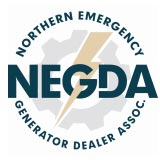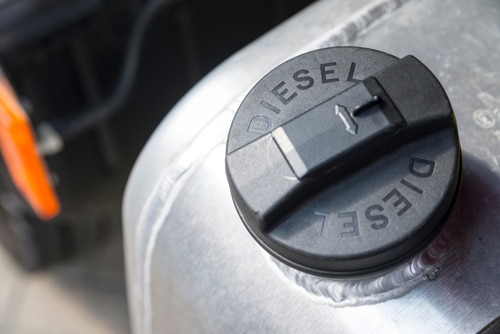
Choosing the right generator for your home or business can be challenging but rewarding in the long run. You want to ensure your generator is powerful enough to handle your energy demands in an emergency.
You also likely want to invest in the most cost-efficient unit and the most convenient machine to maintain and fuel. One of the most significant decisions you will need to make is what to run your generator on.
Natural gas, propane, and diesel are all perfectly viable fuel types to run a generator on, but they have their own unique advantages and disadvantages. Keep reading to learn more about your different generator options, including whether you should choose a propane, natural gas, or diesel generator!
What is the Difference Between Natural Gas, Propane, and Diesel?
It’s important to know the differences between the three fuel types to get a complete understanding. All three are common generator fuel types but are very different in their formulations.
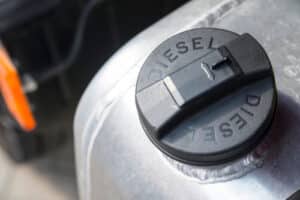
Diesel fuel is a fossil fuel typically created from crude oil, although it can be refined from biomass. It is commonly used for specific combustion engines found in all kinds of vehicles, construction machines, and external generators.
Natural gas is also a fossil fuel found often near oil deposits. It contains different kinds of compounds but is usually mostly methane.
Natural gas deposits formed as plant and animal remains were buried under layers of sand, silt, and rock, just like petroleum and coal. Propane is typically a byproduct of natural gas processing or crude oil refinement.
As natural gas supplies in the U.S. have increased, so have the supplies of propane. It may be surprising to learn that propane is odorless and nontoxic.
The classic rotten egg smell sometimes associated with it is actually added to prevent accidental leaks.
What Are the Advantages of Each Fuel Type in Generators?
Each generator fuel type has advantages. Here are some things to consider when deciding which fuel you want for your generator:
Fuel Cost vs. Fuel Availability
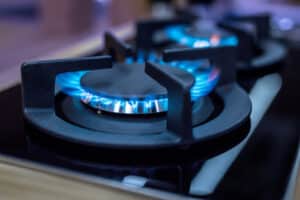
One of the first things that comes to mind when considering fuel options is the cost of fuel. Prices of various fuels are always changing, making it difficult to predict what fuel will be the most cost-efficient in the future.
Historically, both natural gas and propane have been cheaper alternatives to normal fuel, especially diesel. This is primarily due to how much production has been ramped up around harvesting natural gas.
Diesel fuel prices are also much more volatile than natural gas or propane and are typically more expensive due to heavy regulations. In emergency situations, diesel can also become hard to get your hands on.
However, natural gas is mostly available in urban areas, with lines being directly run to houses. Propane is more available to those in rural areas, as is diesel fuel.
Fuel Storage & Safety
Since you will not be running your generator constantly, you will need to consider how fuel storage will affect your decision. Propane can stay stable and safely stored in convenient cans for long periods of time.
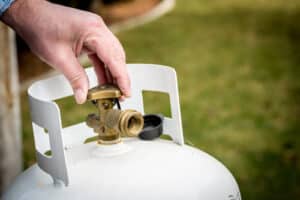
However, you will need to inspect the can regularly to check for leaks or other problems. Diesel fuel needs even more safety measures put in place, such as a fire suppression system and ways to deal with spills. However, storage is relatively convenient.
Natural gas is the most convenient if you have access to it. The gas line is run directly to your home as a utility.
You won’t need any kind of special on-site storage measures. However, if a pipeline is broken, it is usually a much bigger problem than a diesel spill or a propane leak.
Power Output
A generator that can’t meet your energy needs is not ideal. Once you determine the scope of your home or business energy demands, choosing a fuel type for your generator may become more clear.
What diesel lacks in convenience and cost-effectiveness, it makes up for in terms of raw power. A single diesel generator can usually outperform most propane or natural gas generators.
That isn’t to say that natural gas and propane generators aren’t powerful. Most small homes or businesses don’t need the amount of power a diesel generator outputs, making propane or natural gas a much better fit.
Generator Run Time
Blackouts can happen unexpectedly, and you likely won’t know how long they will last. Certain businesses rely on having power at all times of the day and can’t afford to run out of fuel.
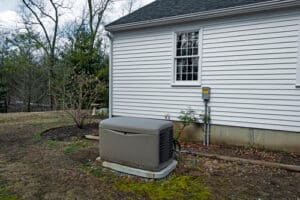
Diesel generators run surprisingly efficiently, providing a steady and continuous supply of power for an extended period of time. Propane generators are less efficient, so depending on your energy needs, the lower prices of propane may be balanced out by the fact that you need more of it.
Under good circumstances, you shouldn’t have to worry about natural gas supply. It can run continuously as it is connected to a utility.
However, if the line is interrupted or damaged, you won’t be able to use your generator until it is repaired. Other things to consider when purchasing a generator are noisiness, pollution, and maintenance concerns.
You can get a free estimate in New England or Massachusetts from Pow’r Point. With the help of a certified technician, you can be sure that you are making the right fuel choice for your standby generator.
Are you still wondering which type of generator may be best for your home or business? Contact the professionals at Pow’r Point Generators in New England today!




